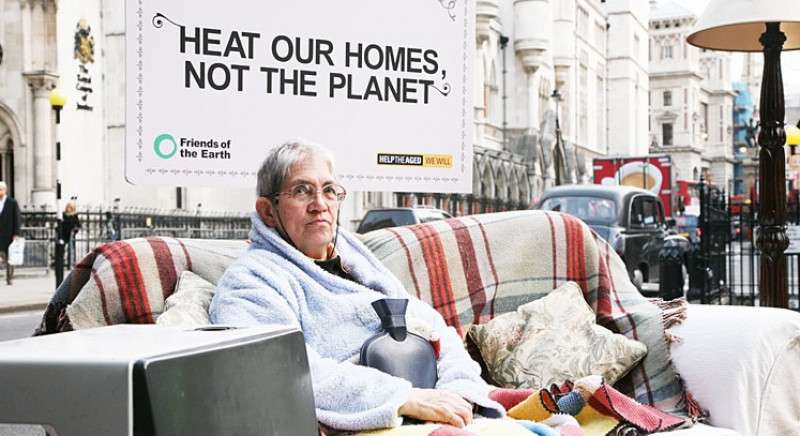News / 17.12.21
A Renovation Wave or ripple for Europe’s energy poor?

Originally published on EU reporter here
The European Commission’s Renovation Wave vowed to alleviate energy poverty and renovate over 35 million buildings last year. Yesterday’s legal proposals to remedy Europe’s inefficient buildings marked the final step to turn these words into action, but has it delivered on its promise to Europe’s energy poor, asks Martha Myers, coordinator of the Right to Energy coalition and climate justice campaigner at Friends of the Earth Europe.
With skyrocketing gas prices, European households are heading for a ‘winter of disconnections’, the worst we have seen in decades [1]. Over 50 million Europeans already live in energy poverty [2], faced with the choice between heating or eating as a result of inefficient housing and a profit-driven energy system. In response to this crisis, EU leaders have failed to deliver little more than a lacklustre toolbox so far [3].
As governments scramble to find adequate solutions at the European Council today, there is no doubt we need short-term, emergency measures to shield vulnerable households urgently. However, it is also time to remedy a root cause of energy poverty: Europe’s leaky, unsafe and inefficient housing [4].
Up until this week, the EU’s ‘Fit for 55’ package, which aims to slash the EU’s greenhouse gas emissions by 55% by 2030, has been framed as the silver bullet for alleviating energy poverty and bringing the co-benefits of the Green Deal into our homes [5]; but it seems the Renovation Wave’s tide may still be out for Europe’s energy poor.With its new proposal published yesterday the Commission did take the important plunge to introduce Minimum Performance Standards (MEPS) in the residential sector [6], a significant step to prioritise renovations for Europe’s leakiest and dangerous housing with the potential to cut energy bills and ensure decent living conditions. With 15% of housing set for renovations under the ‘worst performing’ bracket, this is a start. However, when you scratch at the surface, many details in the package are ropey.
Current plans risk delivering shallow renovations at best, as the Commission left crucial elements at the discretion of Member States. The current revision only requires countries to renovate ‘worst performing’ buildings to energy standard F by 2030 and E by 2033 [7]. This could mean vulnerable households receive little more than LED light bulbs to nudge them out of the worst performing housing bracket unless member states decide to put higher targets in place.
Furthermore, the Deep Renovation Standard is currently set at a meagre 30% energy savings, hardly a commitment to provide highly efficient and decent homes for Europeans.
On a positive note, the revision does require Member States to provide financial and social safeguards alongside the new standards. This is crucial to monitor and protect vulnerable households, particularly in the private residential sector, from potential rent increases or housing affordability problems.
On decarbonisation, this directive was a pivotal opportunity to place energy poor households at the forefront of our energy transition. This is even more pressing in light of the gas crisis and the proposed Emission Trading Scheme to buildings and transport which threatens vulnerable consumers with rising energy bills [8]. The EU has a responsibility to wean energy poor households off of fossil fuels and onto renewables to ensure a Green Deal that leaves no one behind.
Measures have been taken to phase out fossil fuels in new buildings by 2030, but existing buildings are still far too slow with decarbonisation plans to be set for 2040. This endangers climate targets as residential heating contributes to over 12% of total EU carbon emissions and also risks a greater disparity between those who can and can’t participate in the energy transition.
With this current timeline, poorer households are likely to remain locked into fossil fuel infrastructure and left to pay the price for our energy transition for years to come. While the Commission did set an end to financial incentives for fossil fuel boilers for 2027 this would still mean years of fossil fuel subsidies for infrastructure that will subsequently be redundant. It’s urgent we redirect fossil fuel subsidies into measures that can ensure that European households don’t have to use fossil fuels.
Finally, the newly dubbed BRAPs (Building Renovation Action Plans) do require member states to outline energy poverty alleviation, similar to existing (and failing [9]) Long Term Renovation Strategies requirements. They also give a nod towards the substantial hurdle of split incentives between landlord and tenant. However, there are no obligations for Member States to design and deliver deep renovation programmes, and there is little mention of tailored One-Stop-Shop schemes for hard-to-reach households, who are typically excluded from mainstream programmes [10].
Finally, ring-fenced financial support for vulnerable, low income or energy poor households is crucial as we know, funding and financing is the number one barrier to deep renovations, and even zero interest loans have been proven inaccessible to this target group.
The Social Climate Fund remains the only EU commitment to this substantial task. Although it is a start, with so many competing priorities it will be unable to deliver the scale of renovations needed without considerably more funding. The Commission has nudged member states in the right direction to provide financial support to those in energy poverty, but there will need to be a much larger push to galvanize the funds to provide necessary schemes for energy poor households.
Minimum Energy Performance Standards are a welcome start to addressing Europe’s indecent housing crisis, however there is still ample work to be done to ensure every European has access to affordable clean energy, in a decent home that doesn’t cost the earth.
It is now up to Parliament and Council to improve the standards and financial support to deliver on the Renovation waves commitment for Europe’s energy poor.
References
1 CNN 80 million at risk of energy poverty this winter [https://edition.cnn.com/2021/09/30/business/europe-energy-poverty/index.html ]
2 Euractiv Energy crisis could worsen poverty for millions of europeans
[https://www.euractiv.com/section/energy-environment/news/energy-crisis-could-worsen-poverty-for-millions-of-europeans/ ]
3 Right to Energy coalition [https://righttoenergy.org/2021/10/13/shield-energy-poor-from-rising-energy-bills-say-ngos-and-trade-unions/]
4 CAN Europe and Friends of the Earth Europe, hidden costs of Europe’s inefficient housing [https://friendsoftheearth.eu/publication/towards-a-healthy-renovated-europe/]
5 Euractiv, will the Renovation Wave benefit the energy poor [https://www.euractiv.com/section/energy/opinion/will-the-renovation-wave-benefit-the-energy-poor/ ]
6 The Commission’s new buildings legislation proposals [https://ec.europa.eu/commission/presscorner/detail/en/fs_21_6691 ]
7 The Commission’s new buildings legislation proposals https://ec.europa.eu/commission/presscorner/detail/en/fs_21_6691
8 Right to Energy, Fit for 55 not fit for Europe’s energy poor [https://righttoenergy.org/2021/07/14/fit-for-55-not-fit-for-europes-energy-poor/ ]
9 CAN Europe, Friends of the Earth Europe, failure in Long Term Renovation Strategies for energy poverty
[https://caneurope.org/action-on-energy-poverty-lacking-in-the-eu-analysis-of-6-national-plans-reveals/ ]
10 One-stop-shop schemes in mainstream programmes [https://ec.europa.eu/commission/presscorner/detail/en/fs_21_6691 ]
11 Right to Energy: how to alleviate energy poverty in the EPBD briefing [https://righttoenergy.org/wp-content/uploads/2021/11/Briefing-How-to-alleviate-energy-poverty-in-the-EPBD-1.pdf ]
More News

News / 26.02.25

